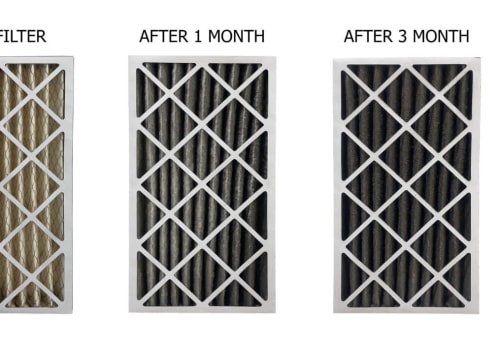How Often Should You Change Your Furnace Filter?
As homeowners, we often prioritize the maintenance of our furnaces to ensure optimal heating efficiency and prolong the lifespan of the system. One crucial aspect of furnace maintenance is regularly changing the filter. But do you know how often should you change your furnace filter? The answer may surprise you, as it depends on various factors such as the type of filter, the air quality in your home, and the usage of your furnace. In this discussion, we will delve into the importance of regular filter replacement, explore the factors that determine the frequency of filter changes, and provide you with tips to determine when it's time for a replacement. So, let's unravel the mystery of furnace filter maintenance and discover the benefits of timely filter changes.
Importance of Regular Filter Replacement
Regularly replacing your furnace filter is of utmost importance for maintaining optimal air quality and ensuring efficient operation of your heating system. Furnace maintenance, particularly filter replacement, plays a crucial role in maintaining a clean and healthy indoor environment.
One of the primary functions of a furnace filter is to trap dust, dirt, allergens, and other airborne particles. Over time, these particles accumulate in the filter, reducing its effectiveness and impeding airflow. When a filter becomes clogged, it forces the furnace to work harder, leading to increased energy consumption and potential damage to the system.
Regular filter replacement improves air filtration, preventing dust and allergens from circulating throughout your home. This is especially important for individuals with respiratory conditions or allergies. A clean filter ensures that the air you breathe is free from harmful pollutants, promoting a healthier living environment.
Furthermore, a clean filter allows your heating system to operate efficiently. When the filter is dirty, it restricts airflow and hampers heat distribution. This can result in uneven heating, increased energy bills, and unnecessary strain on the furnace. By replacing your filter regularly, you can optimize the efficiency of your heating system and potentially extend its lifespan.
Factors That Determine Filter Change Frequency
When determining the frequency of filter changes for your furnace, there are several factors to consider. First, you need to evaluate the efficiency of the filter itself and how well it captures particles. Second, the air quality in your household plays a significant role, as homes with pets or smokers may require more frequent filter changes. Lastly, the usage patterns of your furnace, such as continuous operation during colder months, can impact the filter's lifespan. By taking these factors into account, you can ensure that your filter is changed at the appropriate intervals for optimal performance.
Filter Efficiency Factors
Several factors play a role in determining the frequency at which a furnace filter should be changed. First, the factors affecting filter lifespan include the type of filter being used, the quality of the air in the environment, and the level of contaminants present. Filters with higher MERV ratings tend to have longer lifespans, while filters in dusty or polluted areas may need to be replaced more frequently. Additionally, regular maintenance is crucial for maintaining filter efficiency. Some tips for maintaining filter efficiency include regularly checking the filter for dirt and debris, vacuuming or washing reusable filters, and following the manufacturer's instructions for filter replacement. By considering these filter efficiency factors and following proper maintenance practices, homeowners can ensure that their furnace filters remain effective and efficient.
Household Air Quality
Factors that determine the frequency at which a furnace filter should be changed include the quality of the air in the household environment and the level of contaminants present. Household air quality can be affected by various factors such as the presence of pets, smokers, or individuals with allergies or respiratory conditions. A house located in an area with high levels of pollution or dust may also require more frequent filter maintenance. Regularly changing the furnace filter is essential to ensure that it effectively captures and removes airborne particles and pollutants, improving indoor air quality. Neglecting filter maintenance can lead to reduced airflow, decreased heating or cooling efficiency, and potential health issues for occupants. Therefore, it is important to monitor household air quality and change furnace filters accordingly to maintain a clean and healthy living environment.
Furnace Usage Patterns
The frequency at which a furnace filter should be changed is influenced by the usage patterns of the furnace. Furnace maintenance and energy efficiency are important factors to consider when determining how often to change the filter. Different usage patterns can impact the level of contaminants that accumulate in the filter, which in turn affects its effectiveness. For example, if the furnace is used frequently or for extended periods, the filter may become clogged more quickly and require more frequent replacements. On the other hand, if the furnace is used sparingly, the filter may not accumulate as many contaminants and may not need to be changed as often. Regularly monitoring the filter and assessing the air quality can help determine the appropriate frequency for filter changes, ensuring both optimal furnace performance and energy efficiency.
Recommended Frequency for Standard Disposable Filters
To ensure optimal performance and air quality, it is important to change your furnace filter regularly. Regular furnace maintenance, including filter replacement, is crucial for keeping your HVAC system running efficiently and prolonging its lifespan. The frequency at which you should change your furnace filter depends on various factors, such as the type of filter you use, the air quality in your home, and the usage patterns of your furnace.
Standard disposable filters typically have a lifespan of 1 to 3 months. However, it is recommended to check the manufacturer's guidelines for your specific filter as some may need to be replaced more frequently. If you have pets, allergies, or live in an area with high levels of dust and pollutants, you may need to change your filter more often. Additionally, if you use your furnace frequently or have a larger home, it may be necessary to change the filter more frequently to ensure optimal air quality.
Neglecting to change your furnace filter regularly can lead to reduced airflow, decreased energy efficiency, and poor indoor air quality. A dirty filter can cause your furnace to work harder and potentially result in costly repairs. Therefore, it is essential to establish a regular filter replacement schedule to maintain the efficiency and longevity of your HVAC system.
How Often to Change Electrostatic Filters?
When it comes to electrostatic filters, it is important to understand the recommended frequency for changing them. Factors such as air quality, usage, and the manufacturer's guidelines can all affect the lifespan of these filters. By paying attention to signs of a dirty filter, homeowners can ensure that they change their electrostatic filters at the appropriate time to maintain optimal furnace performance and indoor air quality.
Recommended Filter Change Frequency
Regular maintenance of electrostatic filters is crucial for optimal performance and air quality in your home or office. The recommended filter change frequency depends on various factors affecting filter lifespan. These factors include the type of electrostatic filter, the level of pollutants in the environment, and the frequency of use. On average, electrostatic filters should be replaced every three to six months. However, it is advisable to check the manufacturer's instructions for specific recommendations. Regular maintenance offers several benefits, such as improved air quality by capturing dust, pollen, and other airborne particles, increased energy efficiency, and extended lifespan of your HVAC system. By adhering to the recommended filter change frequency, you can ensure that your electrostatic filters continue to perform effectively and provide clean and healthy air for your space.
Factors Affecting Filter Lifespan
One key factor that influences the lifespan of electrostatic filters is the level of pollutants present in the environment. The more pollutants there are, the quicker the filter will become clogged and less effective. Additionally, the quality of the filter itself plays a significant role in determining its longevity. High-quality filters are designed to capture more particles and can last longer before needing to be replaced. On the other hand, low-quality filters may need to be changed more frequently due to their limited ability to trap pollutants. It is important to consider both the level of pollutants in the environment and the quality of the filter when determining how often to change electrostatic filters for optimal performance and air quality.
Signs of a Dirty Filter
The cleanliness of an electrostatic filter can be determined by observing certain signs, which indicate when it is time to change the filter for optimal performance. One of the most common signs of a dirty filter is reduced airflow. When a filter becomes clogged with dirt, dust, and debris, it restricts the flow of air through the HVAC system. This can result in decreased efficiency and increased energy consumption. Another sign is the presence of visible dirt and dust on the filter itself. If you notice a buildup of dirt on the filter, it is a clear indication that it needs to be replaced. Neglecting filter maintenance can lead to poor indoor air quality, increased wear and tear on the HVAC system, and higher filter replacement costs in the long run.
Tips for Determining When to Change Your Filter
To ensure optimal performance and air quality in your home, it is crucial to accurately determine the appropriate time to change your furnace filter. Establishing a regular filter change schedule is essential for maintaining the efficiency and longevity of your HVAC system. Here are some filter maintenance tips to help you determine when it's time to replace your filter.
Firstly, it is recommended to check your filter at least once a month. This will allow you to assess its condition and determine if it needs replacing. If you notice that the filter is visibly dirty or clogged with debris, it is a clear indication that it needs to be changed. Additionally, if you find that the filter is not effectively trapping dust and allergens, it may be time for a replacement.
Another factor to consider is the type of filter you are using. Different filters have varying lifespans, and it is essential to follow the manufacturer's guidelines for filter replacement. For example, disposable fiberglass filters typically need to be replaced every 30 days, while pleated filters can last up to three months.
Lastly, consider the air quality in your home. If you live in an area with high levels of dust, pet dander, or pollen, you may need to change your filter more frequently. Similarly, if someone in your household suffers from allergies or respiratory issues, it is advisable to replace the filter more often to ensure clean and healthy air.
Benefits of Timely Filter Replacement
Ensuring timely replacement of your furnace filter offers a multitude of benefits for both the efficiency of your HVAC system and the overall air quality in your home. Regular maintenance, including filter replacement, is crucial for keeping your HVAC system running smoothly. By replacing your filter on time, you can prevent a variety of issues that may arise from neglecting this important task.
One of the key benefits of regular filter replacement is improved energy efficiency. A clean filter allows for better airflow, which means your HVAC system doesn't have to work as hard to heat or cool your home. This can result in lower energy bills and reduced wear and tear on your system, ultimately extending its lifespan.
In addition to energy savings, timely filter replacement also contributes to better air quality. The filter's primary function is to trap dust, pollen, pet dander, and other airborne particles, preventing them from circulating throughout your home. Neglecting filter replacement can lead to a buildup of these contaminants, which can exacerbate allergies and respiratory issues, as well as contribute to a generally stuffy environment.
Furthermore, neglecting filter replacement can have consequences for your HVAC system itself. A clogged or dirty filter can restrict airflow, putting strain on the blower motor and other components. This can lead to reduced performance, increased energy consumption, and even system breakdowns if left unaddressed.
Common Signs of a Dirty or Clogged Filter
Regular maintenance of your HVAC system includes monitoring for common signs of a dirty or clogged filter. Recognizing these signs is crucial because a dirty or clogged filter can significantly impact the efficiency and performance of your furnace.
One common sign of a dirty or clogged filter is reduced airflow. When the filter becomes clogged with dust, dirt, and other airborne particles, it restricts the flow of air through the system. As a result, you may notice weaker airflow coming from your vents. This reduced airflow not only affects the comfort level in your home but also puts additional strain on your furnace, potentially leading to higher energy consumption and increased wear and tear on the system.
Another sign to watch out for is increased dust and debris in your home. When the filter is clogged, it fails to effectively capture and trap airborne particles. As a result, these particles are circulated back into your living space, leading to a buildup of dust and debris. If you find yourself constantly dusting and cleaning your home, it may be a sign that your filter needs to be replaced.
Regular filter maintenance offers several benefits. It helps improve indoor air quality by effectively trapping pollutants and allergens. It also ensures optimal airflow, allowing your furnace to operate efficiently and reducing energy consumption. Additionally, timely filter replacement helps prolong the lifespan of your HVAC system and prevents costly repairs.
Frequently Asked Questions
Can I Clean and Reuse My Furnace Filter Instead of Replacing It?
Cleaning and reusing a furnace filter may seem like a cost-effective option, but it is not recommended. Regularly replacing filters is essential for maintaining indoor air quality, preventing system damage, and ensuring optimal heating and cooling efficiency.
Are There Any Health Risks Associated With Not Changing My Furnace Filter Regularly?
Not changing your furnace filter regularly can lead to poor indoor air quality, which can pose health risks. Regularly changing your furnace filter helps improve air quality, reduces allergens, and ensures proper HVAC system function.
What Is the Average Lifespan of a Standard Disposable Furnace Filter?
The average lifespan of a standard disposable furnace filter can vary, but it is generally recommended to replace it every 1-3 months. Regular maintenance and timely filter changes are important for optimal performance and air quality.
Should I Change My Furnace Filter More Frequently if I Have Pets?
Changing your furnace filter more frequently is recommended if you have pets, as they can increase the amount of pet dander in the home. Consider using a HEPA filter to help minimize allergens and improve indoor air quality.
Can a Dirty or Clogged Furnace Filter Affect the Efficiency of My Heating System?
A dirty or clogged furnace filter can significantly impact the efficiency of your heating system. It restricts airflow, causing the system to work harder and consume more energy. Additionally, it can lower air quality and lead to various signs of a clogged filter.



